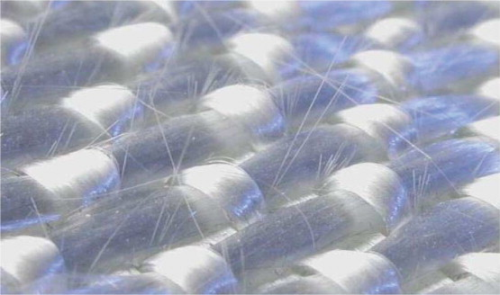
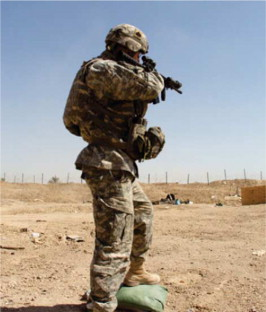
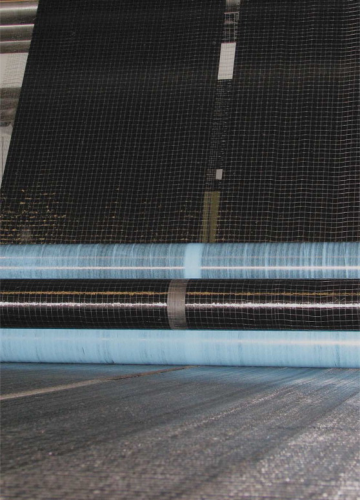
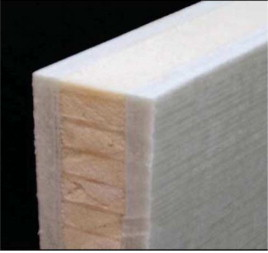
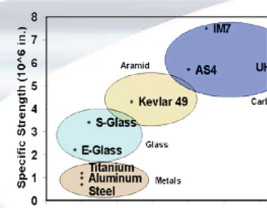
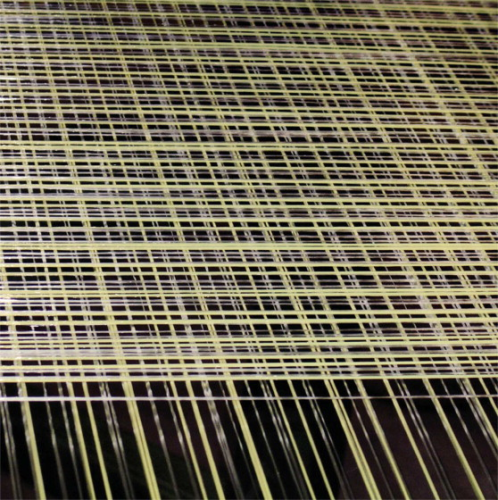
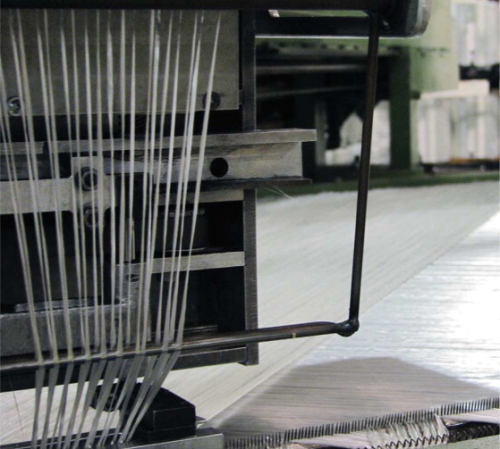
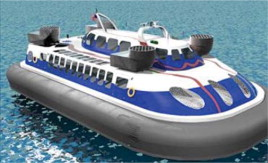
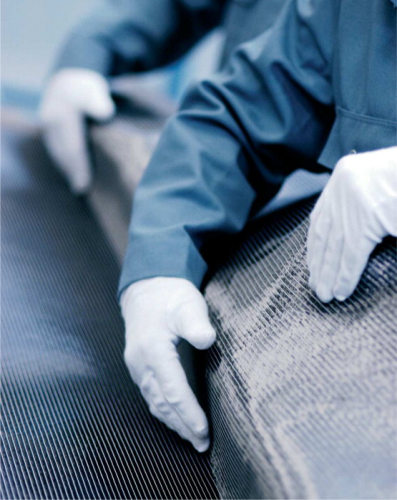
The breakout of material forms within the 18 billion lbs of reinforced plastics forecast in global production by 2010 encompass carbon, aramid and glass fibres (as filaments, yarn, tow), resins (thermoset and thermoplastic), dry forms (including roving, two- and three-dimensional fabrics in flat sheet and rolled goods, preforms, braid and mat), prepregs (the dry forms wetted out with matrix resin), and finally, laminates. When it comes to reinforcement fabric, innovative weaving and stitching technology now makes it easy to tell one's warp from weft, bias from gauge, and to capitalise on the best properties of both woven and nonwoven selections. Strategically combining continuous fibres through weaving, stitching and knitting into fabric provides handleability, mould conformity, and stabilises the reinforcement architecture as designed for specific performance.
Patterns of distinction
Woven fabrics are made on looms with two sets of reinforcement threads interlaced at right angles of 0°/90°, which is warp to weft, or length to width. Plain, satin, twill, harness and other weave patterns determine the ratio of warp to weft interlace points. These points improve impact resistance but can cause fabric to bend or crimp. Woven fabric can capitalise upon unidirectional strength properties, as well as provide thin, light weight and uniform weight fabric plies in a laminate.
Conversely, nonwovens are made from successive layers of stitched or knit fibres aligned with load but at different angles among the layers (usually 0°, 90° and ±45°). These layers are then sewn together, each over the next rather than interlaced as with wovens. This can provide benefits such as:
- non-crimping of fibres (designating such nonwovens as non-crimp fabrics or NCFs);
- reduced ply count, which reduces cost;
- tighter nesting of reinforcement bundles, which boosts overall fibre volume and reduces both labour and cost;
- hybridised fibre types in a single stitched layer or entire fabric, as well as hybridised material forms in a lay-up such as fabric skins with mat or core, and unidirectional with multiaxial reinforcement in one fabric; and
- special flow channel design to optimise resin flow and processability.
Both woven and nonwoven fabrics vary in thickness, areal weight (weight per unit area), and may be coated with sizing or binder. SAERTEX GmbH of Saerbeck, Germany, utilises specially-formulated SAEFIX bonding agent as an option on its standard fabrics to promote self adhesion. The SAEFIX eliminates spraying up an adhesive, such as might be used in boat hull manufacture, but still allows rearrangement of the fabric during lay-up, contains no solvents, and reduces the overall amount of adhesive necessary. The fibres within the fabric stay stretched, producing no waviness.
SAERTEX's standard stitchbonded fabrics (glass, carbon and aramid) include 0° and 90° SAERuni unidirectional and SAERbid bidirectional in 30 mm to 3600 mm width, and SAERMax nonwoven multiaxials, with angles between 22.5° and 90° and 30 mm to 2540 mm width. In a 'stitchbonded fabrics versus woven fabrics' explanation of its products, SAERTEX states that stitchbonded fabrics can provide lower weight and less reinforcement material for the same mechanical characteristic value as woven fabric. The supplier makes NCFs in unidirectional, biaxial, triaxial, quadraxial and pentaxial fabrics.
'Pound for pound, non-crimp reinforcements are 30% stronger than woven fabrics' is the position taken by Vectorply Corp of Phenix City, Alabama USA, which makes both multiaxial NCFs and woven roving. From a cost standpoint, the company's E-QXM 4008 40 ounce (1.24 kg) quadraxial fabric combined with chopped mat offers a single ply replacement for a laminate using two fabrics – 17 ounce (0.53 kg), double bias and 18 ounce (0.56 kg) biaxial.
In 2006, SAERTEX tripled the floor space for its SAERTEX USA LLC in Huntersville, North Carolina, specifically to boost its manufacturing capacity for glass, carbon and aramid NCFs. Vectorply increased its Alabama floor space by 30% to accommodate four additional multiaxial reinforcement manufacturing machines.
High energy for NCFs
Of the multiple markets utilising composites, renewable energy systems comprise a strong niche taking advantage of NCFs. Both SAERTEX and Vectorply list wind energy among their key market segments, as does glass producer, Owens Corning (OC), Toledo, Ohio, USA. All three suppliers report that their wind energy customers want to make larger blades, but also to offset the corresponding higher load with lighter weight and lower cost material.
OC has invested in adding glass fibre knitting lines over the past several years in Brazil and India specifically to provide glass reinforcement fabric to its wind energy customers. Its WindStrand knit fabric is based on OC's HiPer-tex glass reinforcement, made with the supplier's next-generation glass melting, fiberising and sizing technology. On a performance basis, OC claims WindStrand has 35% higher tensile strength than E-glass and 17% higher stiffness. Compared to competing glass/carbon fibre hybrid fabric, WindStrand can offer a 20% cost reduction.
Perhaps the biggest news at OC is its acquisition of St. Gobain's Reinforcements and Composite Fabrics businesses for €431 million (US$640 million), finalised 1 November of this year. The combined assets give OC “a growing global fabrics business,” according to Chuck Dana, president of OC Composite Solutions. The company has also announced expansion plans beginning in 2008 at facilities in Gous-Khroustalny, Russia, and Hangzhou in China.
Another leading glass reinforcements supplier, PPG Industries, of Pittsburgh, Pennsylvania, USA, formed a 50/50 joint venture earlier this year with Devold AMT of Alesund, Norway, to manufacture unidirectional and multiaxial glass reinforcement fabrics for the North American wind energy market. The venture, PPG-Devold, is based in Shelby, North Carolina USA, and combines Devold's stitched reinforcement technology with PPG's established US market presence, giving both companies a stronger position in this 74 000 MW wind energy segment.
A four-year strategic alliance between METYX Composites, Istanbul, Turkey, and Devold AMT announced this summer also has market emphasis in wind energy. In its product mix of engineered fabrics, METYX offers a triaxial fabric suited to the root area where the wind turbine blade joins the hub, with blade length at 90° angle and torsional rigidity provided by ±45° angle plies.
METYX Composites has developed customers in additional markets, such as construction and marine applications, including the Class 40 sailing yacht helmed by Alex Bennett for part of this year's Transatlantic Jacques Vabre race in November. Bennet comments that “the METYX Composites fabrics have been easy to handle during the wetting out process of the build, and have proven particularly easy to use when taping in various structures within the boat.”
Growth spurts
Hexcel Corp, headquartered in Stamford, Connecticut, USA, is applying advanced materials technology to high-performance yachts. In May, the company tested its HexForce carbon fibre woven fabric relative to the in-plane shear requirements of thick, load-bearing marine structure such as hull girders, bulkheads and booms. In a three-ply, symmetric, double bias (±45°) fabric, HexForce NC2 In-ply Symmetric CDB400, mechanical testing was conducted of in-plane shear, tensile, compressive strength and modulus, and cure distortion. Compared to a traditional two-ply asymmetric double-bias fabric, the new fabric is 10% stronger, and the in-ply symmetry also resulted in reduced risk of shear wrinkling and curling.
If new model commercial aircraft, such as the Airbus A380 and Boeing B787, that are utilising up to 50% composites by weight represent the high-performance yachts of the skies, Hexcel is locked into this growing market. HexForce fabric, including carbon/glass and carbon/aramid hybrids, can be found in primary and secondary structure on civil aircraft, from fuselage frames and engine fan blades to floor panels, ducts, galleys and stowage bins, and on structure, stabilisers, rotor blades and interiors aboard helicopters.
Helsinki-based reinforcement supplier Ahlstrom reports in its January-September 2007 operations summary that its Fiber Composites business segment is expected to grow 6–7% this year. In 2006, the company's net sales reached €1.6 billion (US$2.4 billion), of which Fiber Composites' share was €808.2 million ($1.2 billion), with €52.3 million ($77.5 million) in profit. The company also ramped up production at its new speciality fibreglass reinforcement plant in Bishopville, North Carolina, USA, serving the wind energy, marine, building and transportation markets. A new plant serving the glass nonwovens business area will soon be opened in Russia.
Ahlstrom has developed multiaxial, multilayer and hybrid fabrics for diverse applications, featuring unique channel structure, self adhesive and high wet-out properties for closed mould processing, as well as high heat-resistant basalt multiaxials. The multiaxials are stitched and laid down flat in unidirectional to quadraxial fabrics with high glass content and superior surface finish.
The 'textile area' of Sweden is the way Andreas Josefsson, CEO of Oxeon AB, describes the location of the company's new facilities in Boras, which are five times larger than the previous plant in Frolunda. The move in March allowed for larger scale production equipment installation. This, plus 'strong investors and support from universities, institutes and other textile companies has increased our capacity drastically,' Josefsson says, to the point that Oxeon has shipped out 10 000 m2 of its TeXtreme fabric this year (as of mid-November). The woven 0°/90° fabric, available in areal weights from 80 g/m2 and width to 1500 mm, is made from large-tow (12k, 24k) carbon fibre using Oxeon's proprietary spreading and weaving techniques.
Josefsson describes TeXtreme fabric as significantly lower in areal weight than most NCFs, and designed as replacement for traditional fabric requiring 1k, 3k and 6k carbon fibre, which is in relatively short supply. Among customers evaluating the fabric are sporting goods manufacturers, particularly bicycle original equipment manufacturers (OEMs) looking to reduce weight and raise performance.
Ballistic protection
The security/safety market for personal, vehicle and building armour represents another growth area for reinforced fabric. PPG Industries has developed new binder chemistries for its E-glass fabrics used in armour, along with the addition of a high-strength fibre (undisclosed) to its woven fabric portfolio. Gerald Marino, Director of Marketing for Thermosets in PPG's Fiberglass Business Group, cites ballistic protection, light weight and low cost as driving factors in the design of these end products utilising PPG's fabric.
The company also works closely with fabric partners such as 3TEX (see next section) to develop new ballistic material solutions.
V2 Composites of Auburn, Alabama USA, manufactures fabrics with glass, carbon and aramid reinforcement tailored to the mechanical and economic requirements of its individual customer needs.
“We've experienced triple-digit growth since its founding in 1999,” reports Kevin Horne, president and CEO, “and typically manufacture from 3 000 000 lbs to 5 000 000 lbs a year, with capacity for twice that amount.
He adds that the company has sold a large percentage of fabric into the infrastructure rehabilitation market, and also engineered fabric for ballistic applications such as blast panels. One example: creation of a quadraxial NCF combined with an existing woven fabric that produced a panel with superior ballistic performance to panels using 100% of either fabric, and at a lower raw material cost.
Such hybridising, says Horne “has become a natural choice for boat builders, but we are seeing the benefits for ballistic applications as well. The combination of high-performance fibres can offer unique reactions to projectile or blast energy, and actually perform better than non-hybrid materials.”
A new V2 Composites fabric, VWeb unidirectional NCF, is heat bonded onto glass scrim and 'offers exceptional cover in very light areal weights,' according to Horne. Though designed for a broad range of applications, VWeb has proven a good choice 'for adding critical strength and stiffness to structures and for blast hardening and armour, through the efficiency of the unidirectional architecture.'
A hybrid's hybrid
On 15 November, 3TEX of Cary, North Carolina USA received a $2 million appropriation from the US Department of Defense for further development of its trademarked 3WEAVE composite armour technologies in combat vehicles. This technology might be considered the ultimate, or hybrid's hybrid, in that 3TEX uses patented textile preforming processes to weave its three-dimensional (3D) fabric with fibre orientations in the X, Y and Z directions.
To date, the company has produced fabric with carbon, glass, aramid, polyethylene, steel, ceramic and hybrid combinations in thickness up to 2.54 cm and width to 182 cm. Higher raw material cost is offset by process efficiency, along with reduced labour and higher performance – to the point that 3TEX states, “when compared on a cost per square foot of finished composite structure, 3WEAVE reinforcements consistently outperform traditional two-dimensional (2D) materials.”
“3WEAVE fabric does not involve the building up of layers one at a time,” explains Mansour Mohamed, founder of 3TEX. “Rather a single unit of the whole thickness is formed during each weaving cycle. Further, the absence of interlacing between warp and weft yarns allows them to remain straight, and the fabric to bend and internally shear rather easily without buckling within the in-plane reinforcement. This capitalises on integral through-thickness reinforcement, increasing interlaminar strength, resistance to crack formation, and the ability to bridge interlaminar cracks once initiated."
The conformability of 3WEAVE preforms can also result in reduced labour and faster cycle times, regardless of the composite fabrication process, which is important in deep draw and complex curvature moulds.” Mohamed continues. “In light of the trend toward closed moulding and resin infusion, the radically increased permeability and ease of wet-out in 3WEAVE fabrics compared to stacks of 2D materials is perhaps its greatest benefit, especially in processes such as VARTM. The structural regularity and internal openness of the 3WEAVE fibre architecture – which is defined somewhat by the Z-yarn placement – explains this effect. The Z yarns act as capillary channels to transfer resin into the preform interior from the outer surface, translating directly to reduced cycle time (30%) and labour (50%).”
In ballistic applications, 3WEAVE fabric reduces blunt trauma transmitted to the wearer, and increases the armor's ability to withstand multiple strikes. With virtually no crimp, delamination is eliminated, even in edge hits. On shipboard armour, 3WEAVE fabric panels made with phenolic matrix resin can stop high velocity, high caliber ammunition. In pultruded blast resistant panels that are part of Martin Marietta Composites' Transonite line, integrated 3WEAVE fabrics have been tested to withstand five pounds (2.3 kg) of C4 explosives at 36 inches (0.9 m). Mohamed points out that 3WEAVE is not a traditional 3D fabric, such as angle interlock, so it can deliver better mechanical properties, a high degree of conformability and rapid composite fabrication speed in resin infusion processes.
Additional markets served by 3TEX include transportation and marine, hybridised to some extent in a hovercraft project with All Terrain Land and Sea Hovercraft (ATLAS) of Green Cove Springs, Florida, USA. The company has taken a clean sheet design approach to building its 150-passenger vehicle, which rides on a cushion of air. When finished, the 30.48 m long by 15.24 m wide by 9.14 m tall (100 ft long by 50 ft wide by 30 ft tall) AH-100-P marine transport will travel over water at 60 mph (96.6 kmh). 3TEX's trademarked ZPlex, an integrally 3D woven foam core sandwich, provides the strength and stiffness needed in the hovercraft's curved housings for lift fans and thrust nozzles. ATLAS reports that the structure is built and the engines are being installed. Sea trials are expected next year.



